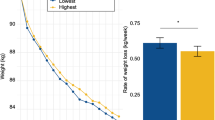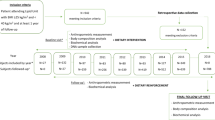Abstract
Obesity has become a major public health problem. Compelling evidence indicates that obesity is largely driven by both genetic predisposition and dramatic changes. Research on the gene–diet interaction has facilitated the choice for individualized diet suggestions to counteract the adverse effect of a risk allele in weight loss. However, preliminary results concerning gene–diet interaction for established loci on body weight maintenance are mostly inconsistent. In the present study, we reviewed studies concerning gene–diet interaction on weight loss or weight regain published during the past 10 years, including cohort studies and clinical trials. Although discrepancy exists, results from nutritional genetic studies based on genetic risk score for obesity provided plausible evidences for gene–diet interaction on body weight maintenance. Future studies with large sample size are needed to overcome the adverse effect of weakened statistical power induced by imprecise measurement of environment factor, and thus identify strong gene–diet interaction on body weight maintenance.
Similar content being viewed by others
References
Papers of particular interest, published recently, have been highlighted as: • Of importance •• Of major importance
Eckel RH. Obesity and heart disease: a statement for healthcare professionals from the Nutrition Committee. Am Heart Assoc Circ. 1997;96(9):3248–50.
Allison DB, Kaprio J, Korkeila M, Koskenvuo M, Neale MC, Hayakawa K. The heritability of body mass index among an international sample of monozygotic twins reared apart. Int J Obes Relat Metab Disord. 1996;20(6):501–6.
Speliotes EK, Willer CJ, Berndt SI, Monda KL, Thorleifsson G, Jackson AU, et al. Association analyses of 249,796 individuals reveal 18 new loci associated with body mass index. Nat Genet. 2010;42(11):937–48.
Choquet H, Meyre D. Molecular basis of obesity: current status and future prospects. Curr Genomics. 2011;12(3):154–68.
Weigle DS, Breen PA, Matthys CC, Callahan HS, Meeuws KE, Burden VR, et al. A high-protein diet induces sustained reductions in appetite, ad libitum caloric intake, and body weight despite compensatory changes in diurnal plasma leptin and ghrelin concentrations. Am J Clin Nutr. 2005;82(1):41–8.
Brehm BJ, Seeley RJ, Daniels SR, D’Alessio DA. A randomized trial comparing a very low carbohydrate diet and a calorie-restricted low fat diet on body weight and cardiovascular risk factors in healthy women. J Clin Endocrinol Metab. 2003;88(4):1617–23.
Toubro S, Astrup A. Randomised comparison of diets for maintaining obese subjects’ weight after major weight loss: ad lib, low fat, high carbohydrate diet v fixed energy intake. BMJ. 1997;314(7073):29–34.
Razquin C, Martinez JA, Martinez-Gonzalez MA, Mitjavila MT, Estruch R, Marti A. A 3 years follow-up of a Mediterranean diet rich in virgin olive oil is associated with high plasma antioxidant capacity and reduced body weight gain. Eur J Clin Nutr. 2009;63(12):1387–93.
de Luis DA, Aller R, Conde R, Izaola O, Gonzalez Sagrado M, Castrodeza SJ. The rs9939609 gene variant in FTO modified the metabolic response of weight loss after a 3-month intervention with a hypocaloric diet. J Investig Med. 2013;61(1):22–6.
Razquin C, Martinez JA, Martinez-Gonzalez MA, Bes-Rastrollo M, Fernandez-Crehuet J, Marti A. A 3-year intervention with a Mediterranean diet modified the association between the rs9939609 gene variant in FTO and body weight changes. Int J Obes. 2010;34(2):266–72.
Grau K, Hansen T, Holst C, Astrup A, Saris WH, Arner P, et al. Macronutrient-specific effect of FTO rs9939609 in response to a 10-week randomized hypo-energetic diet among obese Europeans. Int J Obes. 2009;33(11):1227–34.
Huang T, Qi Q, Li Y, Hu FB, Bray GA, Sacks FM, et al. FTO genotype, dietary protein, and change in appetite: the Preventing Overweight Using Novel Dietary Strategies trial. Am J Clin Nutr. 2014;99(5):1126–30.
Matsuo T, Nakata Y, Murotake Y, Hotta K, Tanaka K. Effects of FTO genotype on weight loss and metabolic risk factors in response to calorie restriction among Japanese women. Obesity. 2012;20(5):1122–6.
Rauhio A, Uusi-Rasi K, Nikkari ST, Kannus P, Sievanen H, Kunnas T. Association of the FTO and ADRB2 genes with body composition and fat distribution in obese women. Maturitas. 2013;76(2):165–71.
Zlatohlavek L, Vrablik M, Motykova E, Ceska R, Vasickova L, Dlouha D, et al. FTO and MC4R gene variants determine BMI changes in children after intensive lifestyle intervention. Clin Biochem. 2013;46(4–5):313–6.
Cinti S. The role of brown adipose tissue in human obesity. Nutr Metab Cardiovasc Dis. 2006;16(8):569–74.
Kim JY, Lee SS. The effects of uncoupling protein 1 and beta3-adrenergic receptor gene polymorphisms on weight loss and lipid profiles in obese women. Int J Vitam Nutr Res. 2010;80(2):87–96.
Nagai N, Sakane N, Kotani K, Hamada T, Tsuzaki K, Moritani T. Uncoupling protein 1 gene −3826 A/G polymorphism is associated with weight loss on a short-term, controlled-energy diet in young women. Nutr Res. 2011;31(4):255–61.
Ruiz JR, Larrarte E, Margareto J, Ares R, Labayen I. Role of beta(2)-adrenergic receptor polymorphisms on body weight and body composition response to energy restriction in obese women: preliminary results. Obesity. 2011;19(1):212–5.
Salopuro T, Pulkkinen L, Lindstrom J, Kolehmainen M, Tolppanen AM, Eriksson JG, et al. Variation in the UCP2 and UCP3 genes associates with abdominal obesity and serum lipids: the Finnish Diabetes Prevention Study. BMC Med Genet. 2009;10(94):1471–2350.
Corella D, Qi L, Sorli JV, Godoy D, Portoles O, Coltell O, et al. Obese subjects carrying the 11482G>A polymorphism at the perilipin locus are resistant to weight loss after dietary energy restriction. J Clin Endocrinol Metab. 2005;90(9):5121–6.
Ruiz JR, Larrarte E, Margareto J, Ares R, Alkorta P, Labayen I. Preliminary findings on the role of PLIN1 polymorphisms on body composition and energy metabolism response to energy restriction in obese women. Br J Nutr. 2011;106(4):486–90.
Salopuro T, Pulkkinen L, Lindstrom J, Eriksson JG, Valle TT, Hamalainen H, et al. Genetic variation in leptin receptor gene is associated with type 2 diabetes and body weight: The Finnish Diabetes Prevention Study. Int J Obes. 2005;29(10):1245–51.
Frayn KN, Karpe F, Fielding BA, Macdonald IA, Coppack SW. Integrative physiology of human adipose tissue. Int J Obes Relat Metab Disord. 2003;27(8):875–88.
Abete I, Goyenechea E, Crujeiras AB, Martinez JA. Inflammatory state and stress condition in weight-lowering Lys109Arg LEPR gene polymorphism carriers. Arch Med Res. 2009;40(4):306–10.
Qi Q, Bray GA, Hu FB, Sacks FM, Qi L. Weight-loss diets modify glucose-dependent insulinotropic polypeptide receptor rs2287019 genotype effects on changes in body weight, fasting glucose, and insulin resistance: the Preventing Overweight Using Novel Dietary Strategies trial. Am J Clin Nutr. 2012;95(2):506–13.
Ugi S, Nishio Y, Yamamoto H, Ikeda K, Kobayashi M, Tsukada S, et al. Relation of the expression of transcriptional factor TFAP2B to that of adipokines in subcutaneous and omental adipose tissues. Obesity. 2010;18(7):1277–82.
Lindgren CM, Heid IM, Randall JC, Lamina C, Steinthorsdottir V, Qi L, et al. Genome-wide association scan meta-analysis identifies three Loci influencing adiposity and fat distribution. PLoS Genet. 2009;5(6):e1000508.
Stocks T, Angquist L, Hager J, Charon C, Holst C, Martinez JA, et al. TFAP2B -dietary protein and glycemic index interactions and weight maintenance after weight loss in the DiOGenes trial. Hum Hered. 2013;75(2–4):213–9.
Erez G, Tirosh A, Rudich A, Meiner V, Schwarzfuchs D, Sharon N, et al. Phenotypic and genetic variation in leptin as determinants of weight regain. Int J Obes. 2011;35(6):785–92.
Larsen LH, Angquist L, Vimaleswaran KS, Hager J, Viguerie N, Loos RJ, et al. Analyses of single nucleotide polymorphisms in selected nutrient-sensitive genes in weight-regain prevention: the DIOGENES study. Am J Clin Nutr. 2012;95(5):1254–60.
Goyenechea E, Dolores Parra M, Alfredo MJ. Weight regain after slimming induced by an energy-restricted diet depends on interleukin-6 and peroxisome-proliferator-activated-receptor-gamma2 gene polymorphisms. Br J Nutr. 2006;96(5):965–72.
Huang T, Zheng Y, Qi Q, Xu M, Ley SH, Li Y, et al. DNA methylation variants at HIF3A locus, B vitamins intake, and long-term weight change: gene-diet interactions in two US cohorts. Diabetes. 2015. doi:10.2337/db15-0264.
Jaaskelainen T, Paananen J, Lindstrom J, Eriksson JG, Tuomilehto J, Uusitupa M. Genetic predisposition to obesity and lifestyle factors--the combined analyses of twenty-six known BMI- and fourteen known waist:hip ratio (WHR)-associated variants in the Finnish Diabetes Prevention Study. Br J Nutr. 2013;110(10):1856–65.
Qi Q, Chu AY, Kang JH, Huang J, Rose LM, Jensen MK, et al. Fried food consumption, genetic risk, and body mass index: gene-diet interaction analysis in three US cohort studies. BMJ. 2014;348:g1610. This paper assessed gene-diet interaction among all established susceptibility loci associated with BMI in GWAS.
Qi Q, Chu AY, Kang JH, Jensen MK, Curhan GC, Pasquale LR, et al. Sugar-sweetened beverages and genetic risk of obesity. N Engl J Med. 2012;367(15):1387–96. This paper assessed gene-diet interaction among all established susceptibility loci associated with BMI in GWAS.
Kantor ED, Giovannucci EL. Gene-diet interactions and their impact on colorectal cancer risk. Curr Nutr Rep. 2015;4(1):13–21.
Moffitt TE, Caspi A, Rutter M. Strategy for investigating interactions between measured genes and measured environments. Arch Gen Psychiatry. 2005;62(5):473–81. This paper reviewed the basic strategies for assessing gene-diet interactions.
Figueiredo JC, Hsu L, Hutter CM, Lin Y, Campbell PT, Baron JA, et al. Genome-wide diet-gene interaction analyses for risk of colorectal cancer. PLoS Genet. 2014;10(4):e1004228.
Compliance with Ethics Guidelines
Conflict of Interest
Kelei Li, Tao Huang, and Duo Li declare that they have no conflict of interest.
Human and Animal Rights and Informed Consent
This article does not contain any studies with human or animal subjects performed by any of the authors.
Author information
Authors and Affiliations
Corresponding author
Additional information
This article is part of the Topical Collection on Genetics
Rights and permissions
About this article
Cite this article
Li, K., Huang, T. & Li, D. Gene–Diet Interaction on Body Weight Maintenance. Curr Nutr Rep 4, 209–213 (2015). https://doi.org/10.1007/s13668-015-0133-7
Published:
Issue Date:
DOI: https://doi.org/10.1007/s13668-015-0133-7




